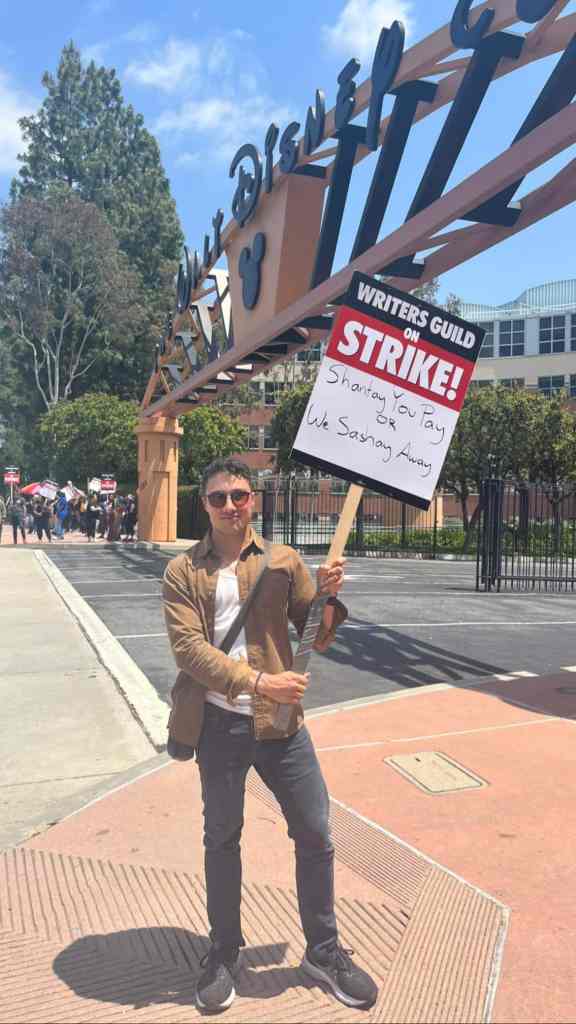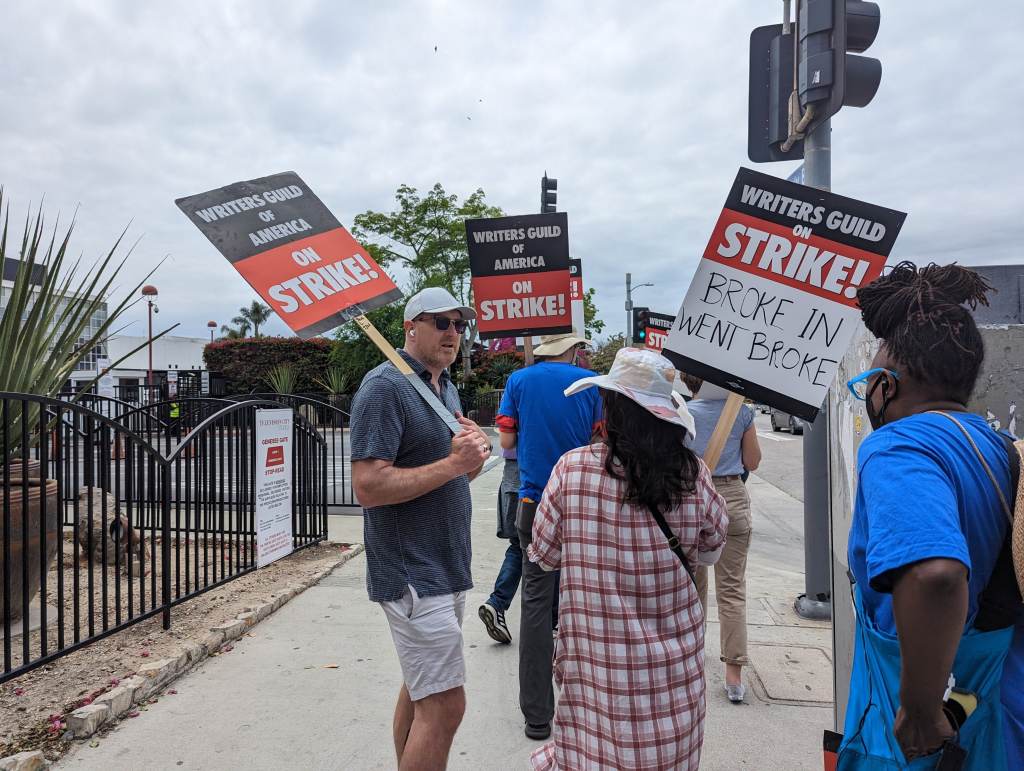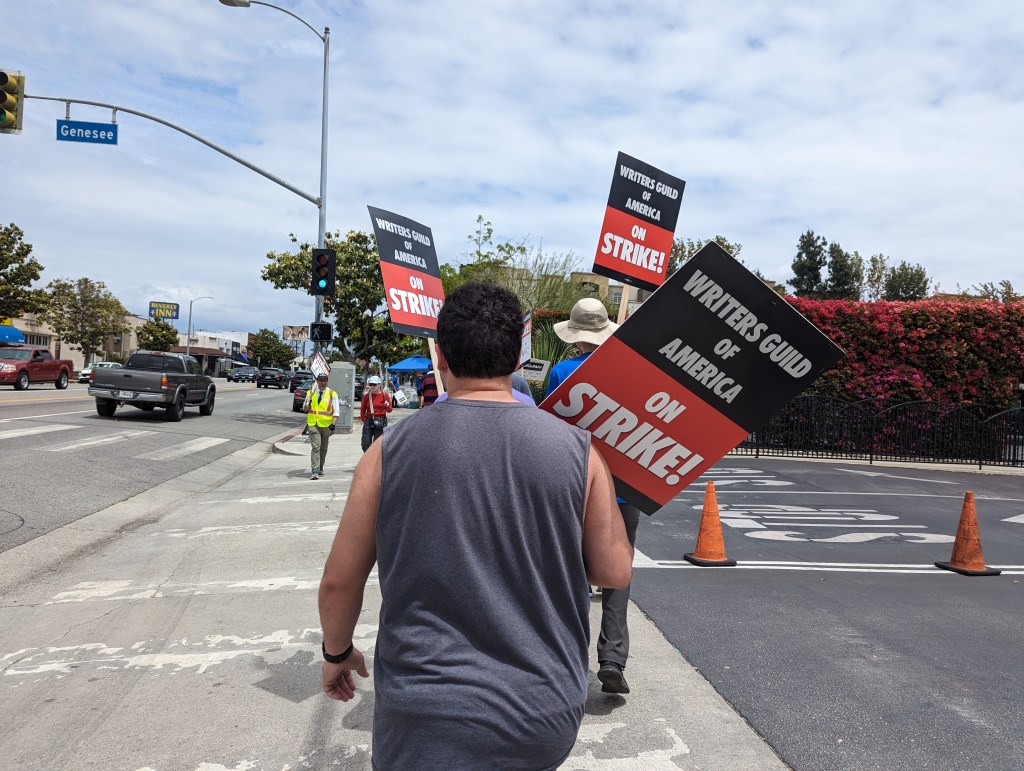We’re now heading into week six of the Writers Guild of America strike, and while I was initially disappointed about the timing, I’ve quickly come to realise that this is one of the most pivotal moments in writing history – not just for America, but for global entertainment.
After establishing myself as an award-winning writer for some of Australia’s biggest comedy shows, including The Project and Hard Quiz, having a comedy film acquired by SBS, and selling a sitcom to a major Sydney production company, it felt like the right moment for an international move.
So, it was impeccable timing when I was offered a scriptwriting job for a production company here in America. I was attached to both a comedy TV series and a feature project. And since landing in Los Angeles a few months back, I’ve also been in development talks with the big studios for a few original shows.
But despite all the exciting projects in the works, it’s all been put on hold due to the strike, which has been ongoing since 2 May, when labour unions representing more than 11,000 writers took industrial action in demand of better wages, stable pay structures, fairer contracts and safeguards over the use of artificial intelligence (AI).
Read: ChatGPT and new AI screenwriting tools: insights from Screen Forever
To put it another way: it’s about the very survival of our industry, not just in the US but everywhere.

The median US writer makes 23% less than they did a decade ago, even though TV show budgets have increased by 50%, and the studios are making record profits. These major corporations are trying to cut writing costs at every turn by hiring fewer writers for shorter periods of time, and refusing to pay residuals by hiding their viewership numbers.
They even want AI to be a part of the writing process to cut further costs. Writing as a career is simply becoming unsustainable, and it’s not a trend that only impacts America, especially since these major corporations have a global presence.
On the picket line
I’ve been out on the picket line almost every day since the strike began. I’ve been stationed outside the major studios, and have volunteered at the Netflix picket, where I lost my voice leading chants of:
Fists up, pens down. LA is a union town!
Raising awareness of important issues is in my DNA as a creative. I decided to write for The Project because of that show’s track record of shining a light on marginalised groups and its ability to raise millions of dollars for charities like Carrie’s Beanies 4 Brain Cancer. So I’m incredibly proud to help amplify this movement’s voice and stand alongside my American writing colleagues.
Experiencing this battle first-hand has been a great opportunity to hear directly from the writers, and I keep hearing the same thing: in an industry that has forever accommodated a basic middle-class life, these writers can no longer make ends meet.
One writer on the picket line told me she had written for a Netflix show but had to get a second job at an ice cream shop because she couldn’t afford to pay her rent. Outside the Disney picket, I met a showrunner who told me he worked on a major streaming show, but all he ever received was 12 cents in residuals.
Healthy TV residuals would often keep the writer afloat while they waited for their next job, but that financial lifeline is now gone. These major corporations are suffocating writers, but writers are only asking for 2% of these companies’ profits, as well as vital regulation around the use of AI.
The reason American TV and movies are revered around the world is because the country has had a healthy industry for so long. It has been able to help writers sustain a career, which has afforded them the time to grow and become experts at the craft. But these major corporations are about to obliterate the very thing that has put America at the forefront of storytelling.
Look out, Australia
If you think this fight only pertains to American writers, you’re sorely mistaken. This battle has made it abundantly clear what these corporations are willing to do, and the Australian entertainment industry is a sitting duck. The Australian Writers Guild is not a trade union, so it has no legal power in helping writers seek fair compensation.
While it is a helpful organisation for Aussie writers, they can only ‘recommend’ what an employer should pay, and it’s ultimately up to companies (and their goodwill) whether to comply.
As the streamers begin getting a foothold in the Australian industry, it’s time to sound the alarm. We’ve now got Netflix, Disney+, Amazon and others making original Australian content. And let’s not forget that Paramount now owns Network Ten. With no trade union behind us, the Aussie writing industry is completely unprepared, and there’s already a knock at the door. We need to demand significant changes immediately.

Read: The Hollywood writers’ strike is a move against digital feudalism
Throughout my career, I’ve been lucky enough to have been respectably compensated for my writing, except on one TV show. For that show (on a major network), I contacted the Fair Work Ombudsman to see what my rights were, and I was informed that my employer only had to pay me the basic federal minimum wage.
The writing industry in Australia lacks adequate protections. And as these corporations tighten their grip on our industry, don’t think for a second that they won’t prioritise maximising profits at the expense of writers. It’s happening right now in America, and American writers have an incredibly strong trade union.
We need compensation guarantees (including for residuals), protections around minimum writer numbers in rooms, guaranteed weeks of employment, and of course AI regulation. It’s already hard enough to make a living as a creative in the Australian entertainment industry, and some of these issues should’ve already been addressed a long time ago.
We’re leaving our creatives behind, and it’s inevitable that these corporations will continue to make conditions worse, unless we get ahead of this fight and demand better conditions for the survival of our industry.





